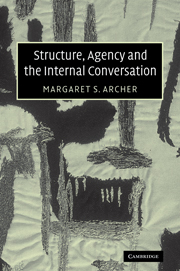Book contents
- Frontmatter
- Dedication
- Contents
- List of figures
- Acknowledgements
- Introduction: how does structure influence agency?
- Part I Solitude and society
- 1 The private life of the social subject
- 2 From introspection to internal conversation: an unfinished journey in three stages
- 3 Reclaiming the internal conversation
- 4 The process of mediation between structure and agency
- Part II Modes of reflexivity and stances towards society
- Index
3 - Reclaiming the internal conversation
Published online by Cambridge University Press: 05 July 2014
- Frontmatter
- Dedication
- Contents
- List of figures
- Acknowledgements
- Introduction: how does structure influence agency?
- Part I Solitude and society
- 1 The private life of the social subject
- 2 From introspection to internal conversation: an unfinished journey in three stages
- 3 Reclaiming the internal conversation
- 4 The process of mediation between structure and agency
- Part II Modes of reflexivity and stances towards society
- Index
Summary
The aim of this chapter is to re-shape the concept of the internal conversation. This is necessary before it can even be considered as the process through which structure is mediated by agency. The achievement of Peirce was to cut the umbilical cord between self-knowledge and introspection. However, the observational model, by which supposedly we ‘looked in’ on our own thoughts was never completely abandoned in American pragmatism. Thus, Mead was still found repeating that he could not turn around fast enough to catch sight of himself in the act. Yet, to the social realist, introspective observation could never be an acceptable model for obtaining self-knowledge, because this perceptual criterion limits one to the level of empirical events. It thus precludes causality from being attributed to unobservable generative mechanisms. Introspection is incorrigibly Humean and irredeemably actualist. Thus, whatever realists might be willing to entertain about the mediatory role of human reflexivity, they could not countenance our reflexive mental activities being conceptualised in observational terms.
Although the pragmatists supplied good supporting reasons for abandoning introspection, they could put forward no alternative model of how we gained self-knowledge. The notion of the ‘internal conversation’, as a concept which defends the interiority, subjectivity and causal efficacy of the life of the mind, never fully emerged in their work. It reached its highest point of development in the thought of Peirce, only to be stripped of these three key (PEP) features by Mead.
- Type
- Chapter
- Information
- Structure, Agency and the Internal Conversation , pp. 93 - 129Publisher: Cambridge University PressPrint publication year: 2003



